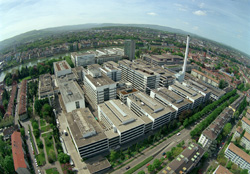 |
| Roche's facilities in Basel, Switzerland--Courtesy of Roche |
While other drugmakers are closing plants in the face of patent losses and revenue challenges, Roche ($RHHBY) is steadily expanding its manufacturing network. The company, which is already spending nearly $900 million to pump up its biologics making capabilities, will undertake another couple of projects that will bring its total investment on manufacturing projects to more than $1 billion.
The Swiss drugmaker said today that it will invest a total of CHF 120 million ($134.6 million) to build new facilities at its Basel headquarters, as well as make upgrades to existing production operations there. Roche said it will invest CHF 85 million ($95.4 million) to build a new facility for small molecule drugs, which it expects to have operational by Q3 2016. In addition, it will invest another CHF 35 million ($39.3 million ) to expand and upgrade an existing facility to make investigational drugs, as well as some products that are already approved. The drugmaker said the facility should be ready in June 2015 but did not indicate how many jobs might be tied to the expansions.
It was more specific in that regard last fall when it rolled out plans for its major expansion for its biologics manufacturing. Roche is the global leader in making cancer products and many of those are biologics, large molecule products manufactured from living cells, like its hot selling Kadcyla, as well as older drugs like Rituxan and Herceptin. The expansion of its biologics production will total more than $880 million for a new facility in Switzerland and expansion of plants in the U.S. and Germany. Those upgrades will roll out over 5 years and it said it expects to add nearly 500 jobs in the process.
The drugmaker last month reported Q1 earnings that were up 5% year-over-year in constant currencies to 11.5 billion Swiss francs ($13 billion). That growth was powered in large part by two of its newer cancer drugs Perjeta and Kadcyla for treating HER2-positive breast cancer. Perjeta, which last year became the first drug approved to treat patients before surgery, has been prescribed by more than 85% of oncologists, market research firm Decision Resources said in March.
- here's the announcement